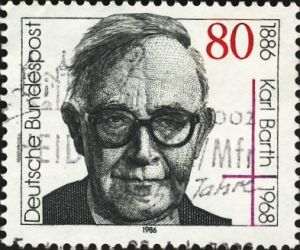Wikisage, the free encyclopedia of the second generation, is digital heritage
Anthropocentrism: Difference between revisions
No edit summary |
(Søren Kierkegaard) |
||
| (7 intermediate revisions by the same user not shown) | |||
| Line 1: | Line 1: | ||
{| class="wikitable" | |||
|<small>The fundamental error of modern times lies in the fact that the yawning abyss of quality in the difference between God and man has been removed. The result in dogmatic theology is a mockery of God ...[[Søren Kierkegaard|S.Kierkegaard]]</small> | |||
[[File:Karl_Barth_Briefmarke.jpg|thumb]] | |||
Anthropocentrism (from the Greek άνθρωπος, '[[man]]', and κέντρον, 'middle'), describes the tendency of people to consider themselves as the central and most important entity in the universe. Correspondingly, it refers to the assessment of reality from an exclusively [[human]] perspective. | Anthropocentrism (from the Greek άνθρωπος, '[[man]]', and κέντρον, 'middle'), describes the tendency of people to consider themselves as the central and most important entity in the universe. Correspondingly, it refers to the assessment of reality from an exclusively [[human]] perspective. | ||
Anthropocentrism is an important concept in the field of environmental ethics and environmental philosophy, where it is often seen as the cause of the problems created by human interaction with the environment. | Anthropocentrism is an important concept in the field of environmental ethics and environmental philosophy, where it is often seen as the cause of the problems created by human interaction with the environment. | ||
Anthropocentrism is the opposite of theocentrism (which represents God-centered), and in a different context from the ecocentrism (or biocentrism) that life and allows the central nature. | Anthropocentrism is the opposite of theocentrism (which represents God-centered), and in a different context from the ecocentrism (or biocentrism) that life and allows the central nature. | ||
|| | |||
==Links== | |||
[http://de.theoriefinder.wikia.com/wiki/Anthroposph%C3%A4re theoriefinder:Anthroposphäre] | |||
<gallery> | |||
File:Frontpage - Robert Fludd - Utriusque cosmi Historia - 1617-19.png | |||
File:Under construction icon.png | |||
</gallery> | |||
<small>translate required</small> | |||
|} | |||
{{Wikidata|Q191624}} | {{Wikidata|Q191624}} | ||
[[ | [[Category:Environmental phylosophy]] | ||
[[nl:Antropocentrisme]] | |||
Latest revision as of 02:56, 8 April 2016
The fundamental error of modern times lies in the fact that the yawning abyss of quality in the difference between God and man has been removed. The result in dogmatic theology is a mockery of God ...S.Kierkegaard
 Anthropocentrism (from the Greek άνθρωπος, 'man', and κέντρον, 'middle'), describes the tendency of people to consider themselves as the central and most important entity in the universe. Correspondingly, it refers to the assessment of reality from an exclusively human perspective. Anthropocentrism is an important concept in the field of environmental ethics and environmental philosophy, where it is often seen as the cause of the problems created by human interaction with the environment. Anthropocentrism is the opposite of theocentrism (which represents God-centered), and in a different context from the ecocentrism (or biocentrism) that life and allows the central nature. |
Linkstranslate required |
